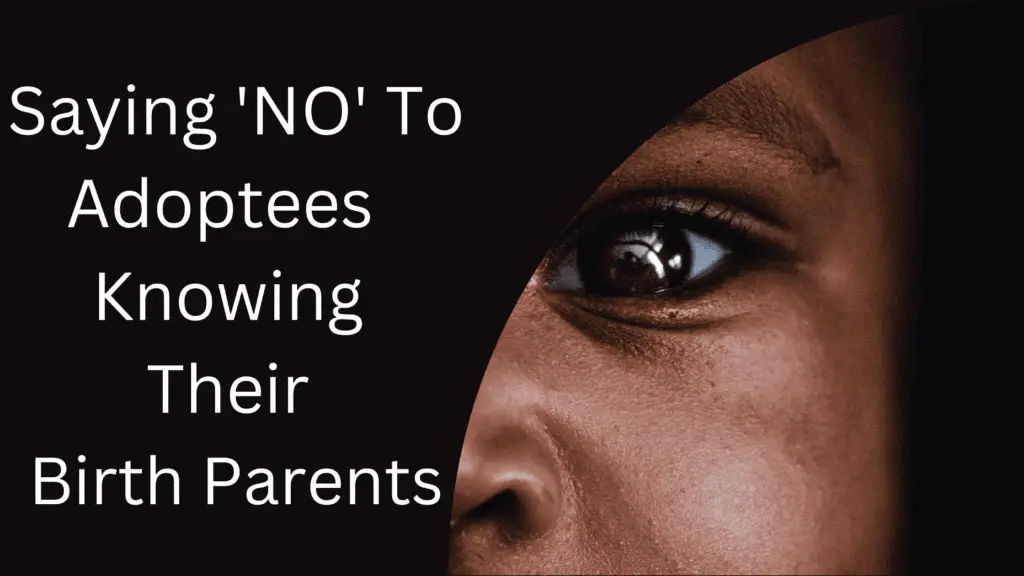The process of adoption, through which a child becomes a permanent member of a new family, often gives rise to inquiries concerning identity, heritage, and the significance of biological ties. Although adoption can bring immense happiness and satisfaction to all involved parties, opinions vary regarding whether adoptees should have access to information about their biological parents. There exists a contentious viewpoint suggesting that adoptees should remain unaware of their birth parents. So, what are the reasons why adoptees should not know their birth parents?
Reasons Why Adoptees Should Not Know Their Birth Parents
Protecting the adoptive family, concerns about rejection, protecting privacy, emotional stability, and legal complications are some of the reasons why adoptees should not know their birth parents. Apart from these reasons, there are also other which we shall discuss.
1. Emotional Turmoil
Meeting birth parents can be a profoundly overwhelming and emotionally demanding experience for adoptees, entailing both closure and comprehension, but also the possibility of significant emotional upheaval. This upheaval arises from diverse factors, including the apprehension of being rejected, the uncertainty surrounding the encounter, and the disruption to one’s established sense of identity.
One primary source of emotional upheaval is the potential for disappointment or rejection. Adoptees often construct idealized images of their birth parents, longing for a connection and validation. However, the reality may not align with their expectations, leading to feelings of sorrow, bewilderment, or even resentment. The birth parents themselves might have their own motivations for creating distance or being unreceptive to a reunion, further contributing to the adoptee’s emotional turmoil.
Numerous adoptees have shared their experiences of negative emotions after meeting their birth parents. One example is Jane, a very close friend of mine, who eagerly sought out her birth mother only to be met with indifference and hostility. Jane’s birth mother expressed resentment towards her for disrupting her life and showed no desire for a relationship. This rejection left Jane devastated, questioning her worth and feeling a profound sense of loss.
2. Disrupting the Adoptive Family
Meeting birth parents has the potential to disrupt the dynamics within the adoptive family. While the desire to connect with one’s birth parents is natural, it can bring about a range of emotions and challenges for the adoptive parents and siblings. These disruptions can stem from feelings of jealousy, insecurity, or the fear of losing the adoptee’s loyalty and love.
One significant factor that can lead to disruptions is the potential for jealousy or resentment from adoptive parents. Adoptive parents may fear that the reunion with birth parents will undermine their own bond with the adoptee. They may worry about being replaced or feel threatened by the presence of the birth parents in their child’s life. These emotions can cause strain within the adoptive family and create a sense of insecurity for the adoptee, torn between their birth and adoptive families.

Similarly, adoptive siblings may experience jealousy or resentment when an adoptee meets their birth parents. They may feel overshadowed or left out, fearing that the newfound connection will disrupt the family dynamics and their own relationships with the adoptee. The fear of being replaced or losing their special bond can create tension and emotional challenges within the adoptive family unit.
3. Legal Complications
Reunion with birth parents can present legal complexities, especially regarding custody and legal conflicts, which can be addressed to reduce confusion and sudden outbursts. While the natural inclination for reunion is understandable, it is important to acknowledge that it may sometimes result in legal disputes and conflicts among birth parents, adoptive parents, and the adoptee.
One potential legal challenge arises from custody battles that may occur after a reunion. Birth parents might attempt to regain custody of their child, particularly if they believe that the adoptive parents are not providing a suitable environment or if circumstances have changed since the adoption. These situations can lead to protracted and emotionally demanding legal disputes, with the court carefully considering the child’s best interests.

4. Personal Safety
Meeting birth parents carries potential risks to personal safety, especially when concerns arise about their history of abuse or criminal behavior. To ensure safety and well-being, it is essential to prioritize the adoptee’s welfare when considering the desire to reconnect with their birth family. One must acknowledge the potential risks associated with such reunions, particularly concerning the history of abuse or criminal behavior in birth parents.
Instances of domestic violence, substance abuse, sexual abuse, or other criminal activities must be taken into account as significant concerns. Reestablishing contact with birth parents who have engaged in such behaviors may expose the adoptee to potential harm or precarious circumstances.
5. Protecting Privacy
Protecting privacy in adoption revolves around respecting the wishes and interests of birth parents who may prefer to remain anonymous or keep their identities private. Closed adoptions emphasize the importance of honoring birth parents’ autonomy and personal choices. It recognizes that birth parents have various reasons for desiring privacy, such as concerns about their own safety or the potential impact on their current families or relationships.
Respecting birth parents’ privacy also acknowledges the potential cultural or religious considerations at play. In certain cultures or religions, the concept of adoption and birth parent anonymity may align with deeply held beliefs and practices. Adhering to these cultural or religious values is seen as a way to preserve birth parents’ rights and prevent any potential conflicts or disruptions that could arise from contact with the adoptee.
Read About: Ways on How to Make your Child Feel Loved and Valued
Protecting privacy also provides peace of mind for birth parents. They may have made the difficult decision to place their child for adoption and wish to move forward with their lives, maintaining the privacy and confidentiality they desire. Respecting these wishes is viewed as a way to support birth parents’ emotional well-being and prevent any unwanted intrusions or disruptions that could arise from contact with the adoptee.
6. Protecting the Adoptive Family
The argument for protecting the adoptive family emphasizes the importance of maintaining stability and a sense of belonging within the adoptive family unit. Advocates for closed adoptions believe that limited or no contact between adoptees and their birth parents helps preserve the adoptive parents’ role as the primary caregivers. By keeping the adoption closed, they aim to avoid potential conflicts or divided loyalties that could arise from establishing relationships with birth parents.
Adoptive parents invest significant time, effort, and love into raising their adopted children. They may feel concerned that the presence of birth parents in the adoptee’s life could disrupt the established family dynamics or blur the lines of parental authority. In this view, open adoption may introduce complexities and challenges that could potentially strain the relationship between adoptive parents and adoptees.
Closed adoption allows for a clear sense of family identity. Adoptees are considered fully integrated members of their adoptive families, and maintaining a closed adoption reinforces this sense of belonging. By limiting contact with birth parents, adoptees can fully embrace their adoptive family’s traditions, values, and culture without the potential confusion or conflict that may arise from interactions with birth relatives.

7. Emotional Stability
Emotional stability, as it pertains to adoptees knowing their birth parents, refers to the belief that maintaining a closed adoption can help protect the emotional well-being and stability of adoptees. Supporters argue that establishing contact with birth parents could potentially disrupt an adoptee’s emotional equilibrium and introduce a range of complex emotions and psychological challenges.
One concern is that knowing one’s birth parents may lead to feelings of confusion and identity crisis. Adoptees might grapple with questions about their origins, their genetic heritage, and their sense of self. The discovery of birth parents could challenge the identity they have formed within their adoptive family and cause emotional distress as they navigate conflicting loyalties and a sense of divided identity.
Establishing contact with birth parents may result in loyalty conflicts. Adoptees may feel torn between their adoptive family, who has raised and cared for them, and their birth parents, who are biologically connected to them. This internal conflict can cause emotional turmoil and strain relationships within both families.
Read About: Why a Child Cries When Parents Fight
Contact with birth parents could potentially expose adoptees to unresolved emotional issues or trauma. For example, if the circumstances surrounding the adoption were challenging or if the birth parents had personal struggles, such as addiction or mental health issues, it could be emotionally difficult for adoptees to confront these realities. Opening the door to contact might unearth painful memories or expose adoptees to unstable or unhealthy family dynamics.
Final Remarks
The belief that adoptees should not know their birth parents is a controversial stance held by some individuals. This is why people hold different reasons why adoptees should not know their birth parents. Various concerns arise when considering a relationship with birth parents, including emotional distress, disruptions within the adoptive family, legal complexities, and personal safety risks. It’s essential to recognize that not all adoptees share these concerns or desires. Many adoptees, driven by natural curiosity and a longing to connect with their biological roots, actively choose to search for their birth parents.
To make an informed decision about pursuing a relationship with birth parents, it is crucial for adoptees to carefully evaluate the potential advantages and disadvantages. They should consider their emotional well-being, the impact on their adoptive family, the legal implications, and their personal safety. Seeking guidance from professionals like counselors or support groups can offer valuable insights and assistance in making well-considered choices.







